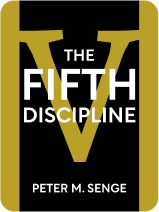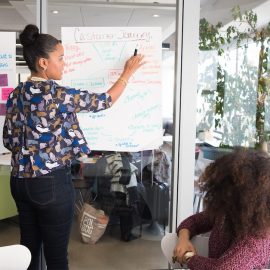

This article is an excerpt from the Shortform book guide to "The Fifth Discipline" by Peter M. Senge. Shortform has the world's best summaries and analyses of books you should be reading.
Like this article? Sign up for a free trial here.
Are you looking for Peter Senge’s quotes from his book The Fifth Discipline? What are some of the most noteworthy passages worth revisiting?
In his book The Fifth Discipline, Peter Senge presents a management framework for creating what he calls a “learning organization.” Senge’s method for doing this is to practice five different disciplines, culminating in the most important, titular fifth discipline—systems thinking.
Keep reading for The Fifth Discipline quotes by Peter Senge.
The Fifth Discipline: The Art & Practice of the Learning Organization
The Fifth Discipline is Peter Senge’s guide to developing a “learning organization”: an organization that encourages its members to constantly develop their skills and to apply those skills to improve the organization.
Below is a selection of Peter Senge’s quotes highlighting some of the key takeaways.
“Personal mastery is the discipline of continually clarifying and deepening our personal vision, of focusing our energies, of developing patience, and of seeing reality objectively. As such, it is an essential cornerstone of the learning organization—the learning organization’s spiritual foundation.”
Personal mastery is the first discipline in Peter Senge’s framework for creating a “learning organization.” When every part of your company—in other words, each person within it—is committed to constant personal growth, the organization as a whole will naturally grow and improve.
To incorporate personal mastery into your business, Senge suggests building the company culture around it from the ground up. In short, every member of your company, as well as the company’s policies, must support honesty, creativity, and challenging the status quo.
“The practice of shared vision involves the skills of unearthing shared “pictures of the future” that foster genuine commitment and enrollment rather than compliance. In mastering this discipline, leaders learn the counterproductiveness of trying to dictate a vision, no matter how heartfelt.”
According to Peter Senge, a shared vision forms when people orient their personal objectives toward an overarching goal. In other words, an organization comes together and says, “This is the future we want,” and then each member of that organization does his or her best to realize that vision.
That doesn’t mean everyone has exactly the same vision, or that they sacrifice their personal aspirations for the shared vision. Rather, everyone’s personal motivations influence how they view the common mission: Each person will approach the common mission in a slightly different way based on their own experiences, duties, and worldview. In fact, when coming up with a common mission, Senge advises you to find out what’s most important to each of your employees and to try to work those goals into it.
“[…] vision without systems thinking ends up painting lovely pictures of the future with no deep understanding of the forces that must be mastered to move from here to there.”
Senge says that businesses often suffer from a lack of systems thinking. Instead of operating as one big system—understanding that every part of the business will influence every other part—many companies try to operate as many individual units, with each person or group only paying attention to their own tasks. In such an organization, there’s no comprehensive understanding of how different functions work together. As a result, functions may interfere with each other without realizing it.

———End of Preview———
Like what you just read? Read the rest of the world's best book summary and analysis of Peter M. Senge's "The Fifth Discipline" at Shortform.
Here's what you'll find in our full The Fifth Discipline summary:
- Why an organization should encourage its members to constantly learn and develop their skills
- The five disciplines for creating an evolving organization
- Why you should constantly assess and update what you think you know






